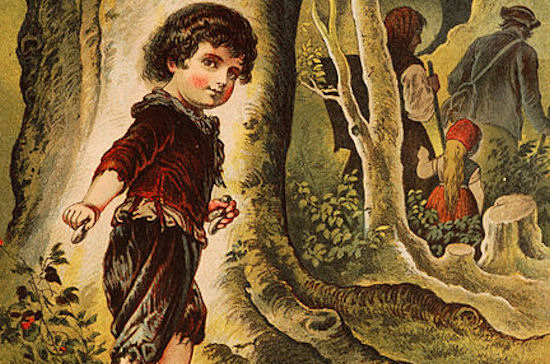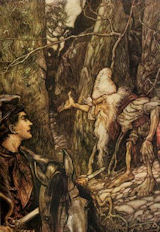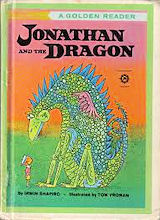Hansel and Gretel, Carl Offterdinger

Introduction 2A — Fairy Tales
The Source of all* Storytelling
(*All,except Myth.)
My excuse is that
I was raised by grandparents from Northern England.
I can still remember snuggling close to my grandma in the
big soft white bed upstairs in the house in Lachine that
exists now only in memory, while she read a story from the
large thick book of Fairy Tales. Meanwhile my grandad
would busy himself with this, and with that, but possibly
he was listening, too.
Parents, I think, have
a much more businesslike attitude to child
rearing, preferring to make clear from an early age the
difference between fantasy and reality:
grandparents, bless them, realize that their duty
lies in protecting grandchildren from the crass
exigencies of what is perceived to be real, and in
feeding them a diet of Fairy Tales for as long as the
child is hungry for such nourishment.
Fairy Tales exist
to introduce us to ourselves, to acquaint us
with our nature, our reality as small unique persons.
And grandparents remember what parents have chosen
to forget: that without storytelling, there is no
reality. And that all storytelling is based either
upon Fairy Tale, or upon Myth,
its ultimate intellectual fulfilment.
In order to qualify
as a Fairy Tale according to
my highly unscientific system of definition, a story
must comprise a number of inescapable elements:—
- A Journey: There's no sitting
around in Fairy Tales. The
hero or heroine of the Fairy Tale story is embarked upon a
special Once upon a lifetime journey,
a bewildering travel from a time before time through a
process of eternal becoming, of continuous change, to a
completion and culmination of All living
happily ever after in a world without the
infernal demands of incessant alteration;
- Aloneness: There's no team spirit in
Fairy Tales. With the noteworthy exception of the brother and sister
combination in Hansel and Gretel, the protagonist of a Fairy
Tale always walks through life alone. And
so we have been given the companionship of Fairy
Tales, to guide and protect us along the way.
- Uniqueness of Character: There's no need
for identity in Fairy Tales. Heroes and heroines may have names to suit
their situations: Cinderella,
for example, or Sleeping
Beauty, and are often described by
birth order (usually youngest). They are
nevertheless unique by virtue of their circumstances and
the detail which surrounds each story.
- Resistance to Change: There's no growing
up in Fairy Tales. At the end of the Fairy Tale
Journey, the circumstances of the protagonists have
changed, always for the better (and heartbreakingly often
the fruits of this good fortune are shared with the
families that have rejected them). But the hero or
heroine is necessarily unaltered — necessarily
because with so much change all about, we need the
constancy of Fairy Tales to
reassure us that we are unalterable in our essential
nature;
- Strangers along the route: There's no
lack of company on the road in Fairy Tales. Another common
element is the journeying child encountering helpful strangers along the route.
(The occasional stranger will hinder, or torment,
rather than assist, depending upon the vagaries of the
plot.) Like everything else in a child's
world, the strangers appear suddenly and inexplicably,
and disappear forever once their essential role has been
played out.
- Creatures with magical powers: There's
no need for fairies in Fairy Tales. No need for fairies, but
the presence of magical creatures such as witches, ogres, dragons, and
trolls is awaited with expectant pleasure in any Fairy
Tale worthy of the name.
- Detail: There's no Fairy Tale without
detail. And that means a wealth of detail, distinctive and
distinctly unsettling detail forming an iridescent backdrop to the
pageant of the obligatory journey, each Fairy
Tale possessing its own unique and
inseparable, unvarying and inexplicable store of features
to pique and burrow into the imagination. Detail
such as:—
- — A troop of unsuccessful suitors and their
horses thrashing
about unable to halt their inexorable downward
slide toward a gruesome death at the foot of the
glass mountain (The
Princess on the Glass Mountain;)
- — A dog with a sleeping Princess on his back
loping through the midnight streets on the way
to a meeting with a waiting stranger (The Soldier
and the Tinder Box;)
- — A head of hair so thick and so strong that
a witch (and later a handsome prince) is able to
climb up and join Rapunzel
in her tower (and, in the same tale, a wife
sickening almost unto death of unappeasable
hunger for the similarly-named salad green
rapunzel growing in the garden of the next-door
neighbour, who happens to be a witch);
- — A golden harp which calls out for help to
its master when it is being stolen by the
marauding Jack of Jack
and the Beanstalk fame (as well
as a hen that lays golden eggs — both
items purloined from a giant that eats
little boys for breakfast).
- Truthfulness:
There's no lying in Fairy Tales. Children
hearing a Fairy Tale have no reason to doubt its essential
truthfulness. They understand instinctively that
the purpose of a Fairy Tale is to reconcile them to their
own natures, and for that reason the story must be recounted
over and over without alteration.
- Humour and irony: There's no irony in
Fairy Tales. There may be, however, a
great deal of humour.
- Innocent amorality: There's no right
and wrong in Fairy Tales. Fairy
Tales are marked by an innocent amorality,
particularly as regards taking what you want because it's
there and you want it.
- Tolerance:
There's no preaching in Fairy Tales.
Things happen in Fairy Tales
because they happen, and the protagonist of the piece
does what he or she must because that's how things
happen. Drawing a lesson is pointless.
- Subterranean Meaning: There's no
explanation in Fairy Tales. None given. None
needed. Each child extracts his or her own essential meaning from
hearing and reading a Fairy Tale
over and over. No one else can ever enter into the
child's comprehension of what is heard, and read, and
understood — which
is probably just as well.
In conclusion.
When my son was very little, his favourite book
was Jonathan
and the Dragon, a modern (1962) American
Fairy Tale, in verse yet, by
Irwin
Shapiro. Library rules
allowed us to keep a book for two weeks after checkout,
with the possibility of renewal for an additional two
weeks unless specifically requested by someone else.
One day the unthinkable happened. Months went
by, and the book was not returned.
After meeting his worried eyes one time too many at bedtime, I
bought my son the book. In hard cover. Complete with dust
jacket.
There are many stories about a hero slaying the dragon.
And some stories where the dragon is outwitted.
But Jonathan chose a different way. To the
consternation of the assembled mayor and townspeople,
Jonathan walked up to the dragon — who had previously
been shot at with a ball from a cannon that bounced off his
head, and fed a toxic soup which he gulped down with obvious
enjoyment — and whispered in this
uninvited guest's ear a polite request that he depart
forthwith. Naturally the dragon complied.
. . .
He stood up slowly, as a dragon must
He walked away in a cloud of dust.
Everyone shouted, Hurrah, Hurray!
For Jonathan has saved the day!
My son was only a small boy, seemingly ready to be formed by
school, church, and societal pressures. But could
it be that already he was in touch with the man he
has become:— friendly, tolerant, and direct;
inventive, independent, and resourceful?
If it's true that Fairy Tales
introduce us to ourselves, and, by virtue of hearing them
over and over, acquaint us with our natures, it seems
obvious that having them read to us gives us the security
of a stamp of approval, as if the world has produced
these unique stories particularly for our
edification. Of course some Fairy
Tales have been sanitized into a state of
cuddly incoherence, but pain, suffering and unimaginable
cruelty are the mainstays of the authentic original
versions, with no correlation between deservingness and
punishment, worthiness and reward.
Outside in the real world, all is frightening uncertainty.
Inside, in the safety of a story told by a truthful
reader to a trusting listener, is the warmth of the
unspoken consolations of the wisdom of the ages.
Next we move on to Fairy Tale's
grownup sophisticated cousin. I refer, of course,
to Myth, and stories we read for ourselves,
rather than having
them read to us.
[June 2007, text only
WebPage last amended
February 20th, 2013]
________________________
-
Top of this Page
- Introduction 2A:— Fairy Tales
-
Main Page – Index
- Main Page – Index
-
HomePage-2
- HomePage-2
Fairy Tale and Myth
-
Previous Page
- HomePage-2
Fairy Tale and Myth
-
Next Page
- Introduction 2B:—
Myth




